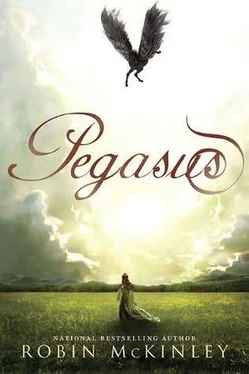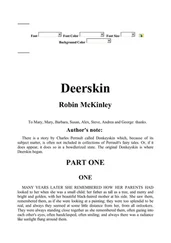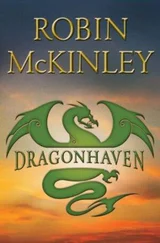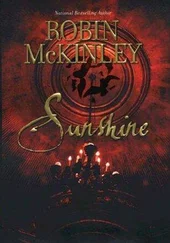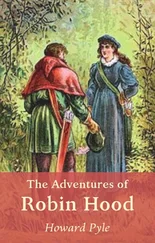There was a rustle of movement and a whisper of suddenly-exhaled breath at the sound of the name Rhiandomeer .
Sylvi stood frozen. She knew she had to say something—but everyone was looking at her—looking at her with those doubtful, sceptical eyes. The great adventure that no one had ever done before: she had had no ritual lines of response to learn because there were no ritual lines of response. When her father had told her there would be an official public declaration of the invitation she had known she would be expected to say something—and sitting surrounded by diagrams of the stress patterns of bridges she had written a few words for this moment, and stared at them till she knew them. But sitting at her desk with no one else present but Ebon and Ahathin and no sound but birdsong and the faintest hush of Ebon’s polishing cloth had not made her words strong enough to withstand this moment, and all those wary eyes....
There was a delicate pinch on the back of her neck, and the tickly feeling of Ebon’s feather-fingers. Say yes, babe, or I’ll spill you off over the Wall next time—got it?
Sylvi sucked in a great lungful of air and said, “I thank you, my father, my mother, and I especially thank you, King Lrrianay and Queen Aliaalia, who are father and mother of my—my Excellent Friend, Ebon, for this most gracious of invitations. I shall try my best to be—be worthy of your generosity and—and—and a—an acceptable ambassador for my people.” She’d had an awful time with that “acceptable.” What could she say about herself that she might be able to live up to, that didn’t make it sound as if she shouldn’t go—as if she knew she shouldn’t go?
She tried to find a friendly face to look at as she spoke, a friendly face among all those mistrustful eyes. There had been a minor flurry at the back of the room as her father spoke, and she looked to see who had entered late: Lorival and Prelling. They were both smiling, and Lorival must have seen Sylvi looking toward her, because she held up her hand in one of the most basic sign-gestures, which meant “excellent” or “well done” or even sometimes “thank you” if you were at a loss—or had to be seen across an audience. Lorival didn’t look to be at a loss; she looked pleased to be present at this historic occasion. Sylvi took another deep breath and said, directly to Lorival, “And I’m looking forward to it!”
This proved to be the right thing to say. Some of the watchful faces relaxed, and there was even a faint murmur of human laughter. She turned gratefully to the others on the platform with her, and she could see Lrrianay smiling—was he picking up what she’d said from Ebon, from her father, from the change in the tone of her voice, from hearing the human audience begin to relax and even laugh a little? Fazuur’s hands were motionless, his face turned away from the pegasus king. Now Aliaalia was smiling too—was she smiling to be seen smiling (how many of the humans present could recognise a pegasus smile?) or because Lrrianay had told her what Sylvi said . . . or because a pegasus shaman had translated for her? She recognised Hissiope, whom she knew to be a shaman. Did they have an official translator? Or more than one? There were a dozen Speakers present, including Ahathin, Fazuur, and Minial.
It was all too complicated. For a moment her courage disappeared and she thought, louder than she meant to, Oh, is this all a terrible mistake?
No, said Ebon. It’s the best idea I’ve ever had. You’ve just never learnt to like being the centre of attention.
But then her mother and father stepped forward to embrace her—and, despite the ban, to embrace Ebon too—and Lrrianay and Aliaalia followed, and did the beautiful pegasus bows, and both of them lightly touched her cheek with a feather-hand. Then Sylvi’s father said to her quietly,“Stay a little while longer, and let everyone congratulate you—including the ones who clearly don’t want to: in fact, especially the ones who clearly don’t want to. You don’t have to say anything but ‘thank you’—or ‘you’ll have to ask the king.’ And then you can go. I’ll face the mob in the Great Court. But I’m afraid you’ll have to come to a few of the discussions about ways and means: breaking tradition always comes with a noise like mountains falling.”
Sylvi was afraid of what great company she would perforce be assigned to, or they to her; if she and Ebon couldn’t go to a country fair without a dozen minders, what would a visit to Rhiandomeer require? And had they figured out how long it would take to climb the Starcloud Mountains on slow human feet? She kept thinking about how the Starcloud Mountains had come by their name: this too was from Viktur’s journal.
Thee land where their Caves do lie, which are thee spirit and thee heart of their people, repose beyond thee mountains to thee north and east. When they do come to visit us, and watch our toil upon thee lowlands to create thee great city-palace Balsin sees so clearly in his mind’s eye, we most of us pause in any work of our hands to watch their approach; and I will not comminate ourselves by declaring us lazy thereby. It is thee sheer sight of thee pegasi that we do not habituate to—cannot so do. I wait in expectation of what our children may make of thee pegasi, for they will have grown up accustomed to looking upon them; perhaps it may be different for them; or perhaps it is a human thing, to look upon such beauty and fail to encompass it, either when walking upon thee ground as they do, as lightly as a bird one might hold in thee hollow of one’s hand, or as great winged beings above our heads.
It was one evening at twilight, with thee last of thee lowering sunne’s rays upon them, brightening their great wings much as they had been illumined on thee first day we had ever seen them, ’tis years ago now, and yet we do still catch our breaths when we look upon them so. There were many of them this evening; thirty or more, for Balsin had called a great Feast for thee laying of thee cornerstones of thee central Palace which was now accomplished, and they did come to honour him and us and thee thing we did create.
Thee border mountains behind them were dark against a blue damask sky; and thee beating of their wings did glister and coruscate. My Sinsi, who was working beside me though her belly now did make it difficult for her to bend far, stared at them and said, “They do look like a cloud of stars.” This was taken up, till all have begun to call thee border mountains Starcloud.
Sylvi’s party would only be able to ride as far as the foothills of the Starclouds. It was all very well that Ebon had permission to take her to the Caves, but how far were the Caves? Was she going to be another pathetic human who only got a day or two inside the pegasus border—and then had to turn around and go home again, because they had already been gone too long?
And could you walk over something called the Starclouds?
She did, as her father predicted, and upon his request, attend a number of meetings on the subject of her journey. These seemed mostly to be a series of prosy old bores standing up in turn and being prosy and boring, and so it was difficult to pay attention and even more difficult to understand any details they might be trying to put forward, although some of them spoke with considerable vehemence. What she did learn was that about a third of the senators, a quarter of the blood and a delegation from the magicians’ guild thought she should not go—and that if there had been so much as one sighting of a taralian or a norindour or a ladon anywhere near the Starclouds, that would have been the end of the matter, and she would have gone nowhere. But there wasn’t, and there hadn’t been for decades. (This didn’t stop her from a small anxious startle every time she saw another travel-stained messenger coming to see one of her parents. It wouldn’t be . . . fate couldn’t be so cruel.) She heard her father once say to Lord Cral that he was tempted to suggest that he was sending his daughter away for her safety; at present there were far too many sightings of taralians and norindours and ladons in the human lowlands.
Читать дальше
